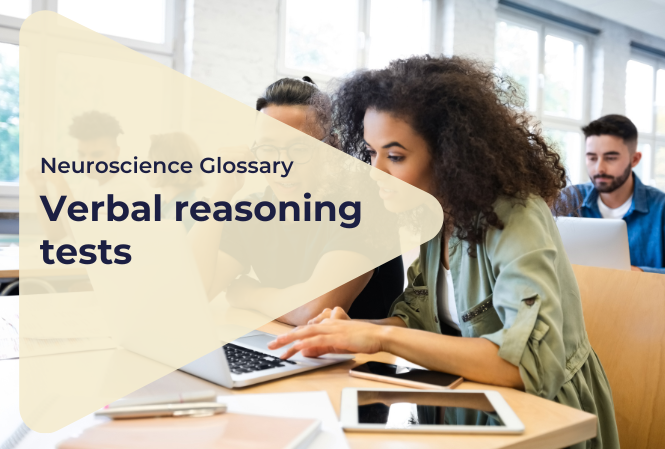
Table of Contents
What is a verbal reasoning test?
Verbal reasoning tests essentially measure comprehension – how well an individual can understand the key points in a passage of written text. Although the verbal reasoning definition is quite simple, it can be a bit more complicated in the context of hiring and recruitment.
In terms of format, they’re often set out in a similar way to tests you might’ve done in English classes at school. Candidates get a passage of text, and will be asked to answer several questions about it. Verbal reasoning test questions are usually multiple choice, with the common answers being simply “true”, “false”, and “cannot say”. This last one indicates that there’s not enough information in the passage to make a call either way.
Did you know?
Historically, verbal reasoning tests were completed on paper. But now, they’re mostly online – at least for recruitment purposes. They will always be timed. Candidates will get a set window to read a given passage, and will then need to answer the questions as quickly as possible.
Verbal reasoning test sample question:
Here’s a shorter version of an example passage you might find in a verbal reasoning test:
“The snow leopard, or ounce, is a big cat in the panthera family that inhabits mountain ranges in both Central and South Asia. With mature individuals numbering at under 10,000 – and further decline of 10% expected by 2040 – they are listed as Vulnerable on the IUCN Red List.”
And here’s a few statements a candidate might be given:
- “Ounce” is not another name for the snow leopard
- The snow leopard is listed as Vulnerable on the IUCN Red List because there are fewer than 10,000 mature individuals
- Habitat decline is causing their numbers to decline
Candidates would be expected to answer “true”, “false”, or “cannot say” to these statements.
Want to read more about psychometrics?
There's a lot more information about psychometrics than we can share in this blog post! If you want to learn more, check out our full guide below.
Why are verbal reasoning tests used in recruitment?
Employers use verbal reasoning tests because they can uncover candidates’ language skills – a key part of most jobs. It’s another data point to add to more traditional selection tools like a CV or interview, meaning they can see a more rounded picture of every candidate’s potential.
Free Playbook: CV-less Hiring
Learn to navigate the skills crisis by looking beyond the CV. Get access to our free in-depth guide on rethinking employment practices, scrapping the CV, and how to implement hiring for potential in your company.
Download the playbook
Are verbal reasoning tests fair?
The short answer is: kind of. Here’s why…
On the surface, they’re completely fair. Every candidate answers the same questions and, barring reasonable adjustments, gets the same amount of time. Also, because it’s clear when an answer on a verbal reasoning test is correct, and when it isn’t, there’s little room for a recruiter or hiring manager to interpret candidates’ answers in a biased way.
But there is evidence to suggest that these types of tests favour candidates from more privileged socio-economic groups. That’s because these groups tend to have more exposure to verbal reasoning tests – through private tutoring, for example. That means they’re less likely to feel the negative effects of test anxiety (where candidates get stressed in a high stakes test scenario).
On the other hand, those from less privileged backgrounds, who won’t have had that same exposure, will be more severely affected by test anxiety on average. That means verbal reasoning tests can make it harder for these groups to show their potential, leading them to underperform. And, in the UK, because less privileged socio-economic groups often overlap with minority ethnic groups, these tests can also impact ethnic diversity too.
Are you an employer?
Find out how Arctic Shores can help you. Get in touch today to streamline your hiring - improving cost efficiency, reducing time to hire and eliminating bias.
Book a demo
If “kind of” fair isn’t quite good enough, and you’re looking for a truly fair way to see your candidates’ potential, don't use a verbal reasoning test and take a look into psychometric assessments.
Find how hiring for potential with our assessment can transform your hiring process and download our Playbook for CV-less hiring.
Get in touch with a member of our team to get started on your journey to seeing more in people.
Verbal Reasoning Test FAQs
There's plenty to know about verbal reasoning tests, and it can be tricky grasping it all at once! That's why we've written some easily digestable answers to frequently asked questions on the topic below.
> What is a verbal reasoning test?
A verbal reasoning test measures a candidate’s ability to understand, interpret, and evaluate written information. Candidates read a passage and respond to statements as "true", "false", or "cannot say", based solely on the information provided. These tests are always timed and multiple-choice.
> Why do employers use verbal reasoning tests in recruitment?
Verbal reasoning tests help employers assess language and comprehension skills, which are essential for many roles. When combined with other tools like interviews or CVs, they offer a more complete picture of candidate potential and decision-making ability.
> Are verbal reasoning tests fair to all candidates?
While verbal reasoning tests offer standardised conditions, they may unintentionally favour candidates from more privileged socio-economic backgrounds, who are more likely to have prior exposure to such tests. This can impact performance and limit diversity in the hiring process.
Want to learn more about our assessment?
Or, if you’d like to learn a bit more about our assessment at Arctic Shores, just let us know here. We’ll get back to you pronto.
In the meantime, download our Playbook for CV-less hiring to find out how hiring for potential can transform your hiring process.
Start your Skills-based hiring journey today
Get in touch to understand how our task-based assessment has helped 150+ leading employers future-proof their hiring process.
Contact usRead Next
Sign up for our newsletter to be notified as soon as our next research piece drops.
Join over 2,000 disruptive TA leaders and get insights into the latest trends turning TA on its head in your inbox, every week
Sign up for our newsletter to be notified as soon as our next research piece drops.
Join over 2,000 disruptive TA leaders and get insights into the latest trends turning TA on its head in your inbox, every week


